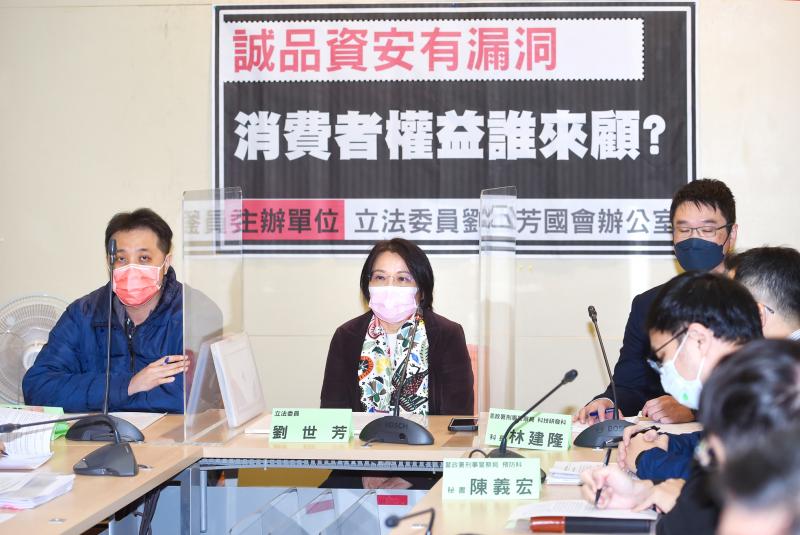Democratic Progressive Party Legislator Liu Shyh-fang (劉世芳) yesterday blasted Eslite and the Ministry of Economic Affairs’ Department of Commerce for failing to protect customer data, after more than 900 fraud complaints involving the firm were recorded last year.
Liu convened a news conference at the Legislative Yuan in Taipei, demanding action from the bookstore chain and saying that its customers have become victims of fraud due to its negligence.
The department and police also have a responsibility to improve oversight at the company, she added.

Photo: Fang Pin-chao, Taipei Times
Liu’s attention on Eslite follows an increasing trend of customer data falling into the hands of scammers, raising concern over consumer rights protections.
There were 3,682 scams reported involving ATM installment payment plans in the first 11 months of last year, with losses totaling more than NT$540 million (US$19.53 million), Liu said, citing Criminal Investigation Bureau data.
Some of these scammers targeted Eslite online customers, pretending to be a company representative requesting that they cancel a mistakenly set installment payment plan by entering their banking information at an ATM, she said.
Eslite customers have filed more than 900 fraud reports or inquiries over the past year, not to mention the many that have likely gone unreported, Liu said.
The bureau last year referred 152 complaints about e-commerce data leaks to other agencies, including 95 to the department, Liu said.
Four of these were about Eslite, one fewer than the amount at which police usually include a company on its weekly list of risky platforms and advises avoiding related scams, she said.
Even though Eslite was the most commonly reported platform to the 165 anti-fraud hotline last year, the company has not reported a single case to police, Liu said.
Many people do not suspect they are about to be scammed when a caller has their order number, date, payment amount, credit card and other information, Liu said, adding that older people and those without their full mental faculties are especially at risk.
Although Eslite in April last year hired an external security firm to review its system, the cause of the leak has yet to be identified, she said, adding that the issue has persisted for more than nine months.
The government is responsibile to respond, Liu said, accusing the department of being too passive.
Although companies are asked to improve data security, the problem clearly persists, she said, calling on police and government agencies to be more active in pursuing a solution, whether legal or otherwise.
Bureau Research and Development Division Director Rufus Lin (林建隆) said that most fraud involving e-commerce platforms involve leaked data.
Eslite members last year filed complaints with police in April, June, August and last month, indicating that the leak is periodic, he said.
However, Eslite has not yet identified the source of the leak, Lin said, adding that the bureau has contacted the department to ask the firm to improve its data security.
Department specialist Hsiao Hsu-tung (蕭旭東) said that inspections of firms with periodic leaks would be conducted this year in accordance with Article 22 of the Personal Data Protection Act (個人資料保護法).
Under the act, companies with unsatisfactory protection practices might be given a deadline to improve and punished accordingly if the deadline is not met, he added.

The Grand Hotel Taipei on Saturday confirmed that its information system had been illegally accessed and expressed its deepest apologies for the concern it has caused its customers, adding that the issue is being investigated by the Ministry of Justice Investigation Bureau. The hotel said that on Tuesday last week, it had discovered an external illegal intrusion into its information system. An initial digital forensic investigation confirmed that parts of the system had been accessed, it said, adding that the possibility that some customer data were stolen and leaked could not be ruled out. The actual scope and content of the affected data

‘LIKE-MINDED PARTNER’: Tako van Popta said it would be inappropriate to delay signing the deal with Taiwan because of China, adding he would promote the issue Canadian senators have stressed Taiwan’s importance for international trade and expressed enthusiasm for ensuring the Taiwan-Canada trade cooperation framework agreement is implemented this year. Representative to Canada Harry Tseng (曾厚仁) in an interview with the Central News Agency (CNA) said he was increasingly uneasy about Ottawa’s delays in signing the agreement, especially as Ottawa has warmed toward Beijing. There are “no negotiations left. Not only [is it] initialed, we have three versions of the text ready: English, French and Mandarin,” Tseng said. “That tells you how close we are to the final signature.” Tseng said that he hoped Canadian Prime Minister Mark Carney

President William Lai (賴清德) yesterday bestowed one of Taiwan’s highest honors on Saint Vincent and the Grenadines (SVG) Ambassador Andrea Clare Bowman in recognition of her contributions to bilateral ties. “By conferring the Order of Brilliant Star with Grand Cordon on Ambassador Bowman today, I want to sincerely thank her, on behalf of the Taiwanese people, for her outstanding contribution to deepening diplomatic ties between Taiwan and SVG,” Lai said at a ceremony held at the Presidential Office in Taipei. He noted that Bowman became SVG’s first ambassador to Taiwan in 2019 and

POSITIVE DEVELOPMENT: Japan and the US are expected to hold in-depth discussions on Taiwan-related issues during the meeting next month, Japanese sources said The holding of a Japan-US leaders’ meeting ahead of US President Donald Trump’s visit to China is positive news for Taiwan, former Japan-Taiwan Exchange Association representative Hiroyasu Izumi said yesterday. After the Liberal Democratic Party’s landslide victory in Japan’s House of Representatives election, Japanese Prime Minister Sanae Takaichi is scheduled to visit the US next month, where she is to meet with Trump ahead of the US president’s planned visit to China from March 31 to April 2 for a meeting with Chinese President Xi Jinping (習近平). Japan and the US are expected to hold in-depth discussions on Taiwan-related issues during the